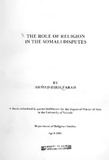| dc.contributor.author | Ahmed, Hirsi F | |
| dc.date.accessioned | 2013-05-08T11:38:39Z | |
| dc.date.available | 2013-05-08T11:38:39Z | |
| dc.date.issued | 2001 | |
| dc.identifier.citation | A thesis submitted in partial fulfillment for the Degree of Master of Arts in the University of Nairobi | en |
| dc.identifier.uri | http://erepository.uonbi.ac.ke:8080/xmlui/handle/123456789/20307 | |
| dc.description.abstract | It is almost a decade since the demise of the Military leadership in Somalia, but the country is yet to get a functional government. The power vacuum left behind has had unprecedented disastrous effect on the civilian population. Somalia has been reduced to one of the world largest producers of displaced persons and the only modem society without government. Numerous efforts with the aim of re storing normalcy have been employed by various governments and inter-governmental bodies but in vain. The methodologies employed are as different as are the sponsors of the efforts.
The collapse of Somalia is more disturbing as it was a nation that had all the ingredients for successful state formation. Its cultural, religious and even consanguinal homogeinty is unique in the continent. Somalis have a rich pastoral culture with well-developed institutions for conflict prevention, transformation and management. However, the current acute conflict seems to be beyond the capacity of traditional institutions. The huge human and property toll of the conflict makes the traditional compensation practice in such cases it possible.
The conflict has been exacerbated by the misuse of religio-cultural institutions of the Somali by the political elite and thus making them non-effective in the resolution of the on-going conflict. Recent efforts to employ cultural institution of conflict resolution in isolation seem not to be bearing fruits. Similarly, the militant use of religion by the different Somali groups frustrates the potential use of the religious leaders who have also been repositories of the Somali traditional culture from using their "good offices" to resolve the conflict.
v
The study utilized both pnmary and secondary data. It heavily draws from the different Somali ethnographical works and collaborate them with field research that involved interviews of both "secular" and "religious" leaders and the common Somalis.
A popular conclusion of the Somali conflict is that it is beyond comprehension and intricately complicated. This study is an effort to shed light on the impact of religion in the conflict and thus a humble effort toward understanding the issue involved in the conflict. It more specifically analysis both the potential contribution in resolution and actual impact of religion in the perpetuation of the conflict. | en |
| dc.language.iso | en | en |
| dc.title | The role of religion in the Somali disputes | en |
| dc.type | Thesis | en |
| local.publisher | Department of Arts-Religious studies | en |

